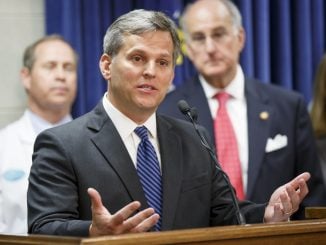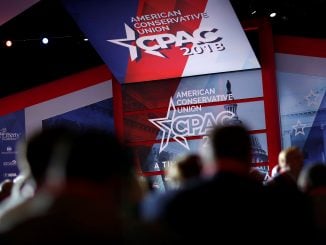APEX — July 29, Vice President Mike Pence and U.S. Secretary of Education Betsy DeVos visited Thales Academy, a year-round private school with eight campuses in North Carolina, to highlight the school’s in-person reopening and to encourage other schools to do the same.
Pence and DeVos began the visit by sitting in teacher Allison Combs’ 4th grade class and speaking with the students. Pence told the students that his wife, who is an elementary teacher, said hello, and so did the president.
He asked Combs how it was for her class so far being back in the classroom. She said they were getting used to the new safety practices, including what she called “zombie hands,” where the students would stretch their arms out to make sure nobody was within an arms’ length of them.
Combs said before Pence had arrived, she got a huge cheer from the class when she asked if they were excited to be back. So Pence asked them to raise their hands if they were excited to return to school, at which their hands shot up.
“Well, we’re excited to see you back in school,” Pence said. “In fact, we’re working with schools all across the country, aren’t we Secretary DeVos, to help states just like North Carolina to have the resources and the guidance to be able to open up schools safely again.”
Secretary DeVos then asked the students what it was like to be back in the classroom.
“It feels super good, because we can actually see our friends and we can actually talk to them in person,” one female student said.
A male student then answered, “My favorite part is seeing my friends again, and seeing my teachers and learning with my teachers.”
“Better than a computer, right?” Combs asked, receiving laughs and nods. “Yeah, I agree,” she then said.
Combs went on to say, “Someone said they spent a lot of time crying during virtual school, and I said, I think a lot of the adults did too. I don’t think you were alone on that one.”
“I hope you have a great year,” Pence said in closing. “Study hard; pray harder. Sky’s the limit.”
The visitors then participated in a roundtable discussion with Bob Luddy, the founder of Thales Academy. Joining them were N.C. Senate Education Committee co-chair state Sen. Deanna Ballard (R-Watauga) and U.S. Reps Mark Walker, Richard Hudson and David Rouzer.
“I want to thank the vice president again for his unwavering commitment to educational choices and to getting students back in school where they belong and where they’re going to learn,” Luddy said.
Luddy then described the Thales schools, which he founded in 2007, saying they are a year-round program now with eight N.C. campuses and 3,650 students. He said because most schools are closed, Thales now has a “tremendously long wait list.”
“I just came from Ms. Combs 4th grade class, and I almost skipped the round table,” Pence said. “We had a great discussion and I could sense the spirit in the room, the enthusiasm the students feel for being back in school, which is where we want all of America’s children to be.”
Pence said he believed they could safely reopen schools and encouraged everyone to continue the strict protections like social distancing and wearing a mask when necessary.
Pence also praised the Thales founder, saying he’s known Luddy for many years, and, “The secretary of Education and I were just reflecting on the fact that there are very few Americans who have done more to expand educational opportunities, particularly for underprivileged children in this country. Bob Luddy, you have our admiration.”
Pence cited the CDC in his statements, saying they recommend opening schools for the health and safety of the students, and that those with special needs and those needing nutritional assistance are especially left behind by keeping schools closed.
During her statements, DeVos announced that the state would receive a Rethink Education Model Grant from the U.S. Department of Education, using CARES Act funds. A press release later that day from her office showed North Carolina’s Department of Public Instruction was awarded $17,632,125 in grants.
DeVos said education funding should follow the student, and, “Certainly if a student’s assigned school refuses to reopen this fall, and forces families to learn remotely with no other option, families should have the option to take the funding set aside for their child’s education to find an alternative that will educate their child full time.”
“Today was an incredible day for Thales Academy!” the school said in a statement on its Facebook page, calling it “a very great honor” to host the event with the vice president, and saying their “students enjoyed the opportunity to meet with him.”
While Pence said during his comments that “the risk the coronavirus poses to healthy children is very low,” Gov. Roy Cooper and the North Carolina Association of Educators (NCAE) are pushing to limit in-person instruction time because they believe it would create an unnecessary risk of spreading COVID-19.
Cooper announced earlier in July that he was directing public schools in the state to adopt either Plan B, which used a mix of in-person and virtual learning, or Plan C, which is entirely remote. The full reopening of schools, encouraged by Pence and DeVos, would not be allowed. Thales Academy, as a private school, is able to fully return to school with in-person instruction, which they did on July 20.
The battle over to what extent to reopen schools for in-person instruction has turned into a heated election-year issue.
Cooper has pushed back on what he called “threats” from the Trump administration to withhold certain funds from schools that refuse to reopen. North Carolina’s largest school systems, mainly in heavily Democratic areas of the state, have decided to start the year entirely online. These include Charlotte-Mecklenburg, Wake County, Guilford County, Orange County and Durham County school systems.
Danielle Alvarez, regional communications director for the Trump campaign, released statistics on reopening in a press release on Pence’s visit, saying that “5.6 million people will be unable to return to work if schools do not open this year according to an estimate from the White House Council of Economic Advisers.” She also cited American Academy of Pediatrics President Dr. Sara Garza as saying distance learning for long periods of time can have a negative impact on a child’s emotional, mental, and physical health, and that there “was a 22% rise in the number of children calling the National Sexual Assault Hotline to report abuse by the end of March.”



